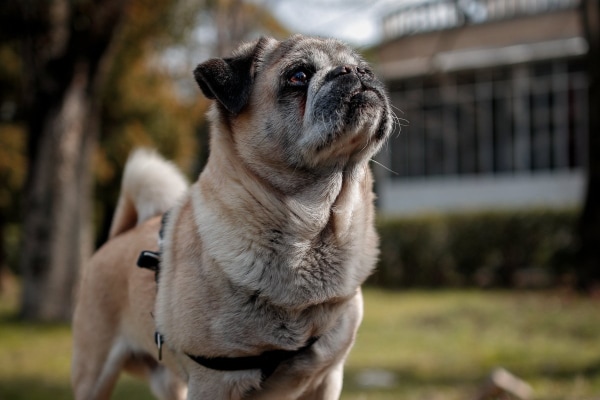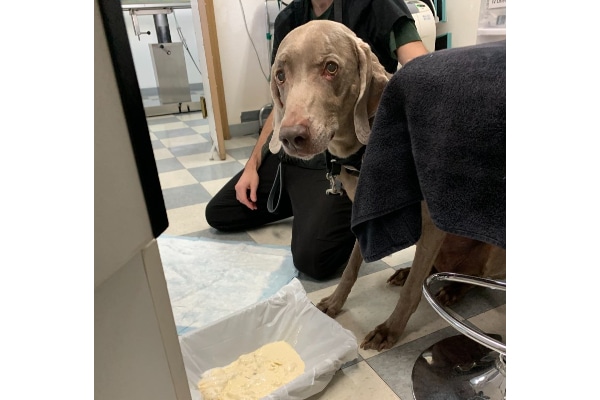Cerenia for dogs is a great medication for pups who suffer from motion sickness or are nauseous for various reasons. Plus, it has some exciting bonus uses. Integrative veterinarian Dr. Julie Buzby explains what Cerenia is and how it works, provides dosing and administration guidelines, reviews Cerenia’s safety and contraindications, and discusses a few alternatives to Cerenia.

Imagine this…it is the middle of the night and your peaceful sleep is suddenly interrupted by the unmistakable sound of your dog retching and vomiting all over your bed.
Or perhaps you’re traveling in the car and, out of nowhere, your dog throws up all over the backseat… and you still have three hours left to drive.
These scenarios—a dog with an upset stomach or a dog vomiting due to motion sickness—are no fun for you or for your dog. Thankfully, though, the anti-nausea medication Cerenia can help save the day.
What is Cerenia for dogs?
Cerenia (i.e. maropitant) is a medication developed by Zoetis that is FDA-approved to treat vomiting in dogs and cats and help prevent motion sickness in dogs. Plus, it may have mild pain-relieving and anti-inflammatory effects. This makes it useful in a variety of other situations, not just for preventing vomiting in dogs.
To understand Cerenia’s primary use—controlling vomiting in dogs—you first need a crash course on the vomiting center of the brain. As the name implies, activation of the vomiting center leads to vomiting.
Regardless of the exact vomit-inducing stimuli, the vomiting center uses the same process to trigger the dog to vomit. Creating this “vomit signal” involves having the neurotransmitter substance P binding to NK1 receptors in the brain.
As you can imagine, stopping substance P from binding to the NK1 receptors would be an effective method of preventing vomiting. And this is exactly what the anti-emetic drug Cerenia does.
The active ingredient in Cerenia, maropitant citrate, is an NK1 receptor antagonist (i.e. blocker). It binds to the NK1 receptors to fill the spot where substance P would normally attach. This makes activation of the vomiting center in the central nervous system much more difficult (but not impossible).
What does Cerenia for dogs do?
In summary, Cerenia does two things for dogs who are vomiting or likely to start vomiting. It helps them stop vomiting and helps prevent dog car sickness. Like a lock and key, Cerenia is the “key” that “locks” the vomiting center of the dog’s brain to make it nearly impossible for a dog to vomit.
What is Cerenia used for in dogs?
Based on how Cerenia works, it makes sense that veterinary medicine primarily uses Cerenia for vomiting and nausea in dogs. However, it’s also used for reducing inflammation, relieving pain, and more. Let’s dive into each use.

Preventing vomiting
When a dog is already vomiting or has a condition that is likely to lead to vomiting, Cerenia is often one of the first medications a vet will reach for. It frequently makes up a key component of “supportive therapy” (i.e. treatment aimed at keeping a dog more comfortable).
Specifically, Cerenia can aid in the prevention of vomiting due to:
- Kidney failure in dogs and kidney disease in dogs
- Nausea following chemotherapy (as demonstrated by a study looking at the efficacy of injectable maropitant (Cerenia) for prevention and treatment of cisplatin-induced emesis in dogs)
- Dietary indiscretion (i.e. eating something that upset a dog’s stomach)
- Nausea after surgery
- Vestibular disease in dogs
- Nausea after inducing vomiting (such as after a dog ate chocolate or another toxin)
- Cancer in dogs
- Pancreatitis in dogs
Additionally, in healthy dogs, the vet might suggest giving a dog Cerenia before a drive as a dog car sickness remedy. It is very effective in the prevention of vomiting due to motion sickness in dogs.
Reducing inflammation in chronic rhinitis and other conditions
Since substance P also plays a role in inflammation, Cerenia may have some anti-inflammatory properties. This can be helpful in conditions such as chronic rhinitis. Dogs who suffer from chronic rhinitis experience inflammation and irritation in the nasal passages. But it appears that Cerenia may help reduce some of that inflammation.
Managing tracheal collapse
In collapsed trachea in dogs, the trachea (i.e. windpipe) becomes weaker and prone to collapse, much like a straw would collapse when drinking a thick milkshake. When this happens, the dog may start coughing or have trouble breathing.
There are a variety of different ways to manage collapsing trachea, including using Cerenia. One small study demonstrated that Cerenia decreased coughing in dogs with collapsing trachea. However, airway inflammation did not improve in that particular study.
Relieving pain
Due to its anti-inflammatory properties, Cerenia works as a mild pain reliever too. Most veterinarians will not reach for Cerenia as the primary way to manage pain. This is the case because is not as strong as other pain medications like gabapentin for dogs or non-steroidal anti-inflammatories (NSAIDs) such as carprofen for dogs. However, in a dog who is both nauseous and painful, such as one with pancreatitis or who recently had surgery, the pain relief from Cerenia is a great additional benefit.
Reducing anesthetic doses
Since Cerenia is able to block pain from the viscera (i.e. abdominal organs), giving it prior to surgery such as a spay can reduce the doses of anesthetic agents necessary for the procedure. And an injection of Cerenia makes dogs less likely to vomit when given opioids prior to surgery.
Additional uses

Recently, Cerenia also has been found to help with several other diseases:
- Vestibular disease in dogs—The vestibular system is one of the areas of the brain that can send stimuli to the vomiting center. Since dogs with old dog syndrome have abnormalities of the vestibular system, Cerenia can help counteract resulting nausea. Additionally, Cerenia might have anti-anxiety properties as well, which can help reduce the anxiety that some dogs with vestibular disease seem to experience.
- Generalized anxiety—Cerenia is thought to help manage anxiety. While it is not usually a first-line anxiety medication like trazodone for dogs, it could be useful for anxious dogs in some situations.
- Elongated soft palate—Dogs who have an elongated soft palate can be prone to increased gagging. Cerenia may help these dogs by decreasing stimulation of the gag reflex.
- Chronic bronchitis in dogs—Cerenia can act as a cough suppressant in some dogs with chronic bronchitis. However, it does not seem to reduce the associated inflammation.
Additionally, there are some veterinarians who believe Cerenia may treat even more conditions (like joint inflammation, skin disease, diarrhea, etc.). However, currently, there is not enough research or a sufficient number of clinical cases to determine whether Cerenia actually works for these diseases or not.
Where do I get Cerenia for dogs?
If your dog has an upset stomach or is suffering from any of the conditions mentioned above, you may be wondering if Cerenia could help your canine companion. If this is the case, your best first step is a veterinary visit.
The vet will start by performing an exam and possibly running some diagnostics to determine what is going on with your dog. Then, if the vet thinks your dog could benefit from Cerenia, he or she will decide which form of Cerenia—injectable solution, oral tablets, or both—is right for your dog.
Cerenia for dogs injection
Your veterinarian will primarily administer injectable Cerenia in the vet hospital. It tends to be a good choice for cases where the dog will only need a single dose.
Some instances where the vet may recommend a Cerenia injection include:
- Before or after surgery (to reduce nausea from the anesthesia or other medications and decrease pain)
- After inducing vomiting in your dog (usually as part of the treatment for toxin ingestion during an emergency vet visit)
- Minor and acute cases of gastrointestinal upset (i.e. vomiting and diarrhea)
- Dogs who do not take oral medications well
- As treatment for nausea from vestibular disease
- Prior to administering chemotherapy or another drug that is likely to cause nausea or vomiting

Cerenia tablets
If your dog is going to need Cerenia for multiple days in a row (or you are going to keep it on hand for when you travel in the car), your veterinarian will probably recommend Cerenia tablets. Cerenia is available in 16 mg, 24 mg, 60 mg, and 160 mg tablets.
What is the Cerenia dosage for dogs?
Your veterinarian will tell you the proper dose of Cerenia for your dog based on his or her body weight. It is important to note that the dose for preventing car sickness is much higher on a milligram of Cerenia per kilogram of body weight (mg/kg) basis than for treating vomiting. Please ensure you follow your vet’s instructions rather than assuming you know how much you should give your dog based on past situations.
Whether your veterinarian gives your dog an injection of Cerenia or recommends the tablets, Cerenia is only dosed once every 24 hours (once daily).
According to the package label, dogs who are four months old or older can take it for two consecutive days for motion sickness. Dogs who are between 2 and 7 months old should take Cerenia for no more than five days in a row for the prevention of acute vomiting. But in dogs older than 7 months old, the FDA has approved long-term use of Cerenia until symptoms resolve or your veterinarian recommends discontinuing it.
Additional dosing information
In addition to dosage frequency, my clients often ask me, “How long does Cerenia for dogs last?” and “How long does it take to work?” These are great questions and are very important to know any time you give your dog medication.
Cerenia usually takes effect within one to two hours of administration. (This is the case for both Cerenia forms—tablets and injections.) And once you (or your vet) gives the medication, it usually lasts for about 24 hours.
How do I give Cerenia to my dog?
Your veterinarian will tell you any specific instructions they have regarding Cerenia administration, but some general rules are:
- Do not change the dosage if the Cerenia is not working for your dog. Instead, consult your veterinarian for help and new treatment ideas. This is especially important if your dog is receiving Cerenia for GI upset and continues to vomit. While not always the case, vomiting despite Cerenia may mean your dog has an intestinal obstruction or other serious condition.
- Cerenia is best administered as whole or half pills. However, this can be challenging because it is bitter tasting and can cause dogs to salivate. If you are having trouble getting your dog to take Cerenia, check out my blog Your Dog Won’t Take Pills? 5 Easy Solutions for Uncooperative Pooches (and be sure to read the comments section of that blog for more great tips). Also, please talk to your vet before trying to crush the pills or make them chewable.
- You can give your dog Cerenia with or without food, depending on the reason your dog is taking the medication. It is best to ask your veterinarian about what is ideal for your dog’s specific case.
Instruction for giving Cerenia to prevent car sickness
If giving Cerenia for car sickness, feed your dog a small amount of food three hours before traveling. This will help reduce nausea associated with having an empty stomach. Then, give the Cerenia tablet two hours prior to getting in the car. Do not give your dog more food or feed a large meal before leaving.

Human health warning
I don’t want to neglect to also tell you that you need to use caution when handling Cerenia. Topical exposure may elicit localized allergic skin reactions and repeated or prolonged exposure may lead to skin sensitization. To help prevent this, always wash your hands thoroughly with soap and water after administering your dog’s Cerenia.
Following these guidelines and your veterinarian’s instructions can help keep you and your dog safe and reduce the risk of side effects.
What are the side effects of Cerenia for dogs?
Interestingly, the most common side effects associated with Cerenia for dogs are an upset stomach, vomiting, or increased salivation (i.e. drooling). I know these side effects sound a lot like the reasons a dog may need Cerenia in the first place. But I assure you that they don’t mean Cerenia is ineffective or unsafe.
Many dogs tolerate Cerenia just fine, and side effects tend to be more common when using the higher dosage of Cerenia (i.e. the dose for preventing motion sickness). Also, contacting your veterinarian for a dosage change can usually help decrease those adverse effects.
It is also worth noting that dogs who receive an injection of Cerenia may have minor localized swelling or itching at the site of the injection.
Other adverse reactions that are less common include:
- Decreased appetite
- Drowsiness
- Being a lethargic dog or having decreased energy
- Diarrhea
- Constipation
- Allergic reactions
- Muscle tremors
- Uncoordinated walking
Does Cerenia make dogs sleepy?
One common question I tend to get is if Cerenia makes dogs sleepy. The manufacturer’s website says that overall Cerenia is non-sedating, unlike some other motion sickness remedies like Dramamine. However, as you can see from the list above, occasionally some lethargy or drowsiness has been reported after Cerenia administration.
What to do if your dog experiences side effects from Cerenia
If your dog is experiencing side effects or you suspect a Cerenia overdose, stop administering Cerenia to your dog immediately and contact your veterinarian. Once he or she knows about the side effects your dog is experiencing, your vet can advise you on the best plan of action.
The good news is that in many cases, side effects are mild and resolve within 24 hours of stopping the medication. This makes Cerenia a drug that is safe for most dogs when used appropriately.

Which dogs should not get Cerenia?
However, there are still some cases where the veterinarian may avoid giving Cerenia or alter the dose. These include:
- Liver disease in dogs— The liver metabolizes Cerenia, so dogs with liver disease (i.e. poorly functioning livers) cannot break down the medication properly. This can cause the medication to not work and increase the chance of adverse reactions.
- Heart disease in dogs—Veterinarians should use Cerenia with caution in pets with heart disease.
- Gastrointestinal obstruction—If your dog possibly ate something that he or she shouldn’t have, please tell your veterinarian before starting Cerenia. Since Cerenia decreases vomiting, it can mask symptoms associated with stomach or intestinal blockages and decrease GI motility.
- Breeding female dogs—Cerenia has not been evaluated for use in pregnant or nursing dogs. If your dog is pregnant or nursing, please discuss her case with your veterinarian before using Cerenia.
- Young dogs—According to the drug label, dogs less than two months old should not take Cerenia for acute vomiting and dogs less than four months old should not receive Cerenia to prevent carsickness.
- Dogs taking certain medications—Cerenia should be used with caution in dogs who are currently taking non-steroidal anti-inflammatories (NSAIDs), cimetidine, erythromycin, ketoconazole, itraconazole, fluoxetine, phenobarbital, and some heart medications.
If your dog falls into one of these categories, your veterinarian may discuss some alternative options to control your dog’s nausea.
Alternatives to Cerenia
Since it is something my clients ask me about, I wanted to briefly mention some other drugs that have a similar effect to Cerenia. However, your vet is still the best person to consult about your dog’s medication choices.
Cerenia vs Dramamine for dogs
The first alternative I often get asked about is Dramamine®. This makes sense because Dramamine is a common anti-nausea medication that humans use for motion sickness. However, it is important to note that products sold under the trade name Dramamine may contain either dimenhydrinate (e.g. Dramamine original), meclizine for dogs (e.g. Dramamine less drowsy), or ginger (e.g. Dramamine non-drowsy). While dimenhydrinate and meclizine are generally safe for dogs when administered under the direction of a veterinarian, the dosing for theses two drugs is not the same.
Thus, it is important to consult your veterinarian to determine if your dog should have a Dramamine product, which product, and what the appropriate dose would be. Please do not give your dog Dramamine without discussing it with your vet.
The biggest difference between Dramamine and Cerenia is that Dramamine is an antihistamine (just like Benadryl for dogs). Therefore, Dramamine is more likely than Cerenia to make your dog sleepy.
And in my experience, Dramamine is also less effective for dogs when compared to Cerenia. Plus, please note that Dramamine is not a good option for upset stomachs or vomiting unrelated to motion sickness.
Cerenia vs Zofran for dogs
Another alternative to Cerenia is ondansetron (Zofran®), which is also an anti-emetic medication. Ondansetron can be more expensive than Cerenia but still has an important place in my vet medication toolbox. One of the great things about it is that it comes in a dosage form you can dissolve in water. This makes Zofran much easier to give to dogs who are difficult to pill.
Additionally, in dogs with severe cases of persistent vomiting, your veterinarian might recommend using ondansetron and Cerenia together. Zofran, like Cerenia, is not available over the counter, so your veterinarian would need to prescribe it for your dog. If you have Zofran at home that has been prescribed to you, do not give it to your dog.

Cerenia and Pepcid for dogs
While it is an antacid, Pepcid (i.e. famotidine) does have some anti-nausea effects in certain species, including dogs. More frequently though, your vet will use Pepcid (or a different antacid like omeprazole for dogs) to reduce stomach acid amounts. This can be helpful in cases of acid reflux in dogs.
Plus, the antacid effects of Pepcid can protect the lining of the esophagus from being “burned” by stomach acid when a dog is frequently or chronically vomiting. Thus, there are times when the vet may recommend using Cerenia and Pepcid together. This is generally a safe combination. But like any medication, it is best to consult your vet before giving your dog any new medication.
Cerenia and Pepto-Bismol
While these three medications we just discussed are safe for dogs when prescribed or recommended by your vet, I do not recommend using Pepto-Bismol for dogs. It is not a good alternative to Cerenia because it can cause gastric ulcers, may interact negatively with other medications, and could turn your dog’s stool black.
Talk with your vet about Cerenia
As we just discussed, there are some other anti-nausea medications available. But I still think Cerenia is a great choice for many of my patients. It works quickly to reduce or prevent nausea and vomiting, only needs to be given once a day, and is safe and effective for most dogs.
If car sickness is putting a damper on your trips or your dog wakes up feeling a bit queasy, give your vet a call. He or she can help you figure out if Cerenia (or something else) is the solution you are looking for. And then you can get back to enjoying life to the fullest with your pup.


My 4 year old maltipoo starting regurgitating all her food 2 hours after eating. She’s had a complete work up: labs, ultrasound, xray but everything is negative. The cerenia completely stopped the regurgitation, but I’m still worried about the cause. Any thoughts on what could be causing the regurgitation?
Hi Stella,
I am sorry your girl is having these severe GI issues. It is hard to make specific conclusions without examining your girl myself. Since all of her testing came back normal, I am at a loss as to what the cause could be. If this problem persists despite giving the Cerenia, it may be time to consider scheduling an appointment with an internal medicine specialist. Hoping all is well and praying you won’t have to worry about this again in the future. Best wishes to you and your pup!
yes I have a senior standard poodle. who have tracheal problem. vet put him on Cerenia for 14 days well coughing slowed down drastically. after 14 days it come back ( the coughing). right now we are repeating the 14 days again. q: can your dog stay on Cerenia permanently. what are the effects if so?
thank you.
Hi Veronica,
I am sorry your Poodle is dealing with this ongoing tracheal problem. Cerenia is not labeled for long term use, but sometimes veterinarians have to use medications “off label” (in a manner other than what is specified by the manufacturer) when it is in the best interest of their patients. I have used this medication in my own patients for longer than 14 days with great success and did not see any negative side effects. I am not sure what the potential risks would be. I encourage you to discuss this with your vet and together you can decide on the best course of action for your pup. Praying for relief for your sweet boy and wishing you both all the best.
You noted dogs with liver disease should not get Cerenia, but what about dogs with a corrected liver shut? Would you suggest cerenia or zofran?
Hi Nicole,
This is a great question. If the liver is functioning normally after the surgical correction, I am not sure the Cerenia warning would still apply. With that being said, this is a topic I would rather leave for a specialist to answer. Your vet should be able to reach out to a local internal medicine specialist and get their expert opinion. If you do find out new information that would be helpful to others, please feel free to comment again and share your knowledge with us! Best wishes to you and yours.
My dog was peppy when I brought her in and after the first dose of Cerenia, she has been very lethargy. Now they said they can’t help me to get her to other vet.
It hasn’t been 24 hours will the med wear off? Does it cause lethargy?
Hi Phyllis,
I am sorry your pup is not feeling well, and I understand your concern. I am not aware of Cerenia causing lethargy, but I guess it is possible. I would be worried the lethargy is another symptom of your dog’s underlying issue (I assume this is what your vet is thinking as well and the reason why they recommended another vet/offered referral). Cerenia does wear off after 24 hours so, if this is the cause of the lethargy, you should notice an improvement after this period of time. Hoping you can get some answers and find a way to restore your girl’s health. Best wishes to you and your pup.
My senior shih tzu mix had chronic reverse sneezing and it started to turn more like breathing issue then reverse sneeze overtime. OTC allergy medications didn’t work, cough tablets recommended by vet didn’t work. Tried cerenia 16mg for a few days and he’s been fantastic. Diagnosed with rhinitis since cernia helped. My old boy is doing great.
Hi Khrysten,
What a great outcome! Thank you for sharing your experience with us. Glad to hear your boy is feeling better and hoping the Cerenia will continue to offer relief.
My 15 yr old female Maltipoo has kidney failure, UTIs, trach collapse, cancer, pancreatitis, & more!
My vet said 5 days of 16mg Cernia every 24hrs..1st day was horrible!! tremors, anxiety, rapid heart, panting, dilated pupils, not eating, i actually thought her heart was gonna explode! This drug is a demon as far as Im concerned & NEVER again! Its 1:30AM & searching someway to counteract this drug…I hope it works better on other dogs than it did mine..Pray4Gracie!
Dear Steve,
I am sorry Gracie is exhibiting these severe symptoms and I understand why you are worried. While it is possible these issues could be due to the administration of Cerenia, I would want to make sure there is nothing else contributing to her symptoms that needs to be addressed. With all of the concurrent health issues Gracie has, it is possible the timing of these problems is just a coincidence. Please contact your vet right away and make sure they are aware of what is happening. Praying for comfort and relief for your sweet girl. Feel free to leave an update if you have a chance.
I’m reading all these comments and is very skeptical and very concerned about this medication. I took my 1 year old Gokden retreiver to the vet for a suspected obstruction. Xrays and sonar showed no signs of obstruction and vet administered an injection of Cerenia. Since then he has taken a turn for the worse. Completely unresponsive, shallow breathing, excess drooling like crazy. Low body temperature, still vomiting, not eating at all. Like a comatosed state!!!! I’m worried sick and it’s after hours. When I search this product is says adverse reactions and side effects are very rare. but reading all the above comments tells me the opposite. What if my dog actually does have an obstruction that was not visible on the x-ray and the vet administered Cerenia
to him. Can this have fatal consequences?
Dear Vicky,
I am sorry your young dog experienced these life-threatening symptoms and I understand your worry and concern. Without examining him myself it is hard to make specific conclusions. I can say that I am almost 100% certain the Cerenia injection did not cause the decline you witnessed. The way Cerenia works is it blocks neuro receptors that send vomiting signals to the brain. It only helps to prevent nausea and is known to also have anti-inflammatory properties. It doesn’t cause GI stasis and would have no way to perpetuate an obstruction if one was present. I hope you were able to contact your vet and get your boy the immediate medical attention he needed. Praying he was able to pull through and wishing you all the best.
Comment*
My 7 year old 7. Lb Bolognese had an injection yesterday and can barely move.
He is dazed and confused and will not eat at all. It’s been 26 hours. The vet said 24.
The prescribed the pill when needed 8 mg pill. I read the paperwork and it says Cerenia injection o to 20 pounds. I am hoping he didn’t give My 7 pound dog something that they would give a 20 pound dog. Vet is closed today, but l will find out tomorrow as it definitely should be more specific to weight. I appreciate any information.
Hi Sonya,
I am sorry your pup is experiencing these severe symptoms and understand your concern. I am not sure what paperwork you have that listed a dosage for Cerenia for dogs 0-20 pounds. The only dosage information I have (or found with research) all list dosage based on the individual weight of the dog in mg/kg. Here is a link to the dosing chart on the Zoetis website: https://www.zoetisus.com/content/pages/products/petcare/Cerenia-Resources/documents/Cerenia-Dosing-Chart.pdf
With that being said, it is common for some medications to have a wide range of safety and the same dose may be used for dogs of many different sizes. Think about medications for humans. A 120-pound person will probably take the same dosage of Tylenol as a 180-pound person. Of course, if you have any hesitation about the care your pup has received, don’t hesitate to reach out to your vet. This could be as simple as a misunderstanding about the way your vet has the invoices set up in their computer system. They may just charge the same fee for the injection (no matter what quantity was administered) as long as the dog is 20 pounds or less. What you have may just be a fee listed and not the actual dosage that was given. I hope that helps to clear things up a bit. Wishing you all the best and take care!
Yes emergi vet gave my 51 pound 14 year old dog 10 mg injection Cornish for on offf diarrhea mushy poop that kept on over two weeks and within two hours she was completely unable to use her back legs or barely keep her head up, then a fever of 103. Something or higher set in, she felt so hot, and monday vet confirmed! And she wouldn’t eat. After Saturday emergi pet visit for diarrhea for about two weeks on and off again…it was and a day and half later on Monday she was put to sleep….I guess because liver failure… the complete blood test count whatever it’s called showed her liver enzymes were high and kidney also high. ….which vet showed me. She had a very excellent appetite at all times up to Saturday am. No jaundice, no weight loss over recent prior months. She was a senior who loved walks and toys and her food! It has been heartbreaking. I’m devastated and don’t know whether she needed to be put down or not. I jus followed the vet advice….but it doesn’t make any sense.
Dear Ann,
I am sorry for the loss of your senior pup. I can only imagine how much you miss her. It makes the grieving process even more emotional when you are left with more questions than answers about how things progressed. Without having been personally involved with your girl’s medical care it is hard to make specific conclusions about what happened. I am certain your pup knew how much you loved her and that your presence during those final days was a comfort. I hope with time the grief will fade and your heart can begin to heal. May the memories of all the good times you shared continue to be a blessing in your life. ♥
My 9-year-old Olde English Bulldog Woodson recently suffered aspiration pneumonia and came within a day of being euthanized. After a 5-day hospitalization he appears to be recovering from that, but he was also diagnosed with GERD. He has always been a good eater and remains so, but he began vomiting within a couple hours after eating. Our vet put him on a Rx of Cerenia along with a diet-change plan and that has stopped the post-meal vomiting entirely. My question now is, can Cerenia become a rest-of-life, daily addition to his diet. He is not on any other medications at this time and seems to be recovering well.
Hi James,
I am sorry Woodson endured this scary situation but so glad he was able to pull through and recover. I have had several patients take Cerenia on a long-term basis but not sure I have first-hand experience with one who used this medication for life. I was not able to find any research that listed potential complications from extended use. As far as I know this shouldn’t cause any problems. It may be a good idea to reach out to a specialist and get their expert opinion. Your vet can make a referral if needed. The specialist may also have ideas about treatments or therapies that may not be readily available in general practice. Hoping you can find the answers you need to ensure Woodson has many happy years ahead. Wishing you both nothing but the best!
My chihuahua mix had a day of vomiting, no known suspicious ingestion. 6 months ago had similar episode, had a full work up with labs and xrays which was negative. Slow feeder seemed to help the vomiting. This time, only added a cortisol, and treated him with an injection of cerenia, and famotidine, and fluids. He kept on vomiting for the next several hours and over night but today seems much better. Eating and drinking normally, eliminating normally, energy improving throughout the day. Vet says he should be hospitalized anyway as “it’s very abnormal to vomit through that very powerful antiemetic.” That seems extreme to me as he seems ok today. Is it considered very abnormal to have a few more hours of vomiting after a cerenia injection? He is also now taking sucralfate and omeprazole orally.
Hi Beth,
I am sorry your little guy is having these recurring issues with vomiting. I agree that most dogs do not continue to vomit after receiving Cerenia, but I guess anything is possible. It is hard for me to make specific conclusions about how to proceed with treatment without examining your pup myself. Ultimately, you have to do what you feel most comfortable with and make sure you take your veterinarian’s experience and advice into consideration. Hoping your boy is feeling better today and all is well. Wishing him the best for a full recovery and many happy days ahead.
My senior aged dog is experiencing kidney failure and wouldn’t eat. Cernia by injection (at the vet’s) and some tablets to use at home have helped immensely and she is eating again. I know she’s terminal, but it’s still nice to see her enjoying food and begging for scraps like her usual self! My question is why is it only used for a few days at a time? (my vet said no more than 3-4 days per week) I haven’t been able to find any explanation for this, but would like to know more..
Hi Heather,
To be honest I am not sure! I know that is how the directions are printed on the label/package insert. So, to prescribe this medication in any other way is considered “off label”. With that being said, veterinarians have to use products off label quite often due to a lack of veterinary specific products. As long as your veterinarian makes you aware of an “off label” usage, and you are comfortable with the potential risks, it is ok to use medications as directed by your vet even if it is different from what the manufacturer recommends. I have many colleagues that use Cerenia long term to treat many different conditions and have had great success without any negative effects or complications. Sometimes the reason a drug only gets labeled for a certain period of time is because that is how it was tested when it received its FDA approval. While it could be safe to use Cerenia long term, the label will never offer this as a recommendation until the company has paid for long term studies to be done and gets it approved by the government. I hope that clears things up a bit. Best wishes to you and yours!
I’ve recently read that some Vets are prescribing daily, long term Cerenia for Laryngeal Paralysis. There is some anecdotal evidence that it helps some dogs. Have you heard anything about this off label use?
Hi Mary,
Yes! I have many colleagues who use Cerenia in this way and it has been very successful. We are finding that Cerenia has many uses as an anti-inflammatory medication and therefore can be beneficial for numerous diseases and conditions.
my golden retriever is on day 3 and I will not give another one. he is lethargic and won’t eat . he has never not eaten for a full day. he didn’t do this before the pills.
Hi Natashia,
I’m so sorry that your Golden isn’t feeling well and isn’t eating. If you haven’t already, it would be a great idea to check in with your vet. I’m not sure what he was taking the Cerenia for, but I wanted to mention that while the lethargy and lack of appetite could be related to the Cerenia, it is also possible that whatever condition caused him to need the Cerenia in the first place is worsening and is responsible for those signs. I hope you are able to find some answers for your pup and that he feels better soon!
My dog got exactly the same, not eating at all!
the cerenia injection helped immensely but the pills don’t help at all
When my got a shot of cerenia it worked very well but the pills didn’t. The first time I gave her the pill she foamed at the mouth for 2-3 hours. The second time I gave her a pill she threw it up
Hi Sharon,
I am sorry your dog had such a negative reaction to the taste of the Cerenia tablets. What a blessing it comes in the injectable form as well. Thank you for sharing your experience with us!
Yes we use cerenia for both our chihuahua who has collapsing trachea and our border collie who has problems with an ulcer and collapsing trachea. We have also used when all our four senior rescues have had coughing issues and other meds don’t work.
Hi Terrie,
I love that Cerenia has anti-inflammatory properties and can do so many good things! Thank you for sharing your experience with our readers!